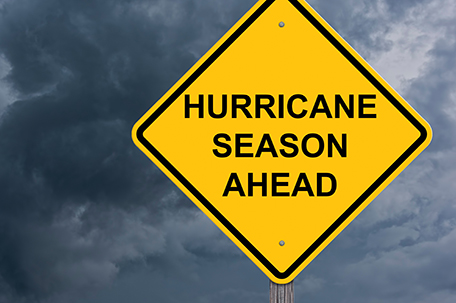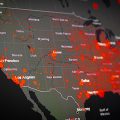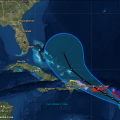
By Seth Borenstein
ASSOCIATED PRESS
Officials across the South are still scrambling to adjust their hurricane plans to the coronavirus. The big unknown: Where will people fleeing storms go?
The Associated Press surveyed more than 70 counties and states from Texas to Virginia, with more than 60% of coastal counties saying as of late May that they’re still solidifying plans for public hurricane shelters. They’re also altering preparations for dealing with the sick and elderly, protective equipment and cleanup costs.
In Georgia’s McIntosh County, south of Savannah, Emergency Management Agency Director Ty Poppell said evacuations during the pandemic would be a “nightmare.” He worried about social distancing at shelters and on buses used to get people out.
“I’d love to be able to tell you we’ve got that answered right now,” Poppell said. “It’s a work in progress.”
Hurricane season officially started June 1, though Tropical Storms Arthur and Bertha arrived early. Forecasters are expecting a busier-than-normal season.
“Everything that we do will be affected in one way or another, big and/or small, by COVID-19,” Florida Emergency Management Director Jared Moskowitz said.
Many counties are taking federal advice and hope to use hotels as smaller-scale shelters, while others plan to use more parts of schools besides large gymnasiums. Still others, especially in Louisiana, plan for big shelters with more social distancing.
Officials emphasize that shelters are last resorts, urging people to stay with friends or in hotels. But massive unemployment is making the expense of hotels less feasible.
“Our biggest change to our hurricane plan is sheltering. How are we going to shelter those that have to evacuate? How are going to shelter those that are positive COVID patients? There are multiple ideas that we are considering right now,” Mississippi Emergency Management Agency Director Greg Michel said.
During tornadoes in April, the state used hotels as shelters, which was good practice for hurricane season, he said.
Most counties surveyed said they’re still figuring out shelters.
While that may sound worrisome, it could be beneficial because emergency managers need to update plans as the pandemic changes, University of South Carolina disaster expert Susan Cutter said.
“Disasters are not going to stop for COVID-19,” Brad Kieserman, an American Red Cross executive, told reporters in May. “Hope is not a plan. And we’ve got to plan for tens of thousands of people to evacuate in the face of hurricanes and wildfires and other disasters.”
Some officials acknowledged they aren’t as ready for storm season as they were a year ago because of the virus. Others were more confident.
“We feel the current rating of preparedness for Craven County (North Carolina) is 50% or lower as we still have not finalized shelter options,” said Stanley Kite, emergency services director of the county hit by 2018’s Hurricane Florence. “Before COVID-19, would have estimated 90%.”
Shelters were the most mentioned worry, but comfort levels with other aspects of hurricane preparations varied, reflecting the difference in how states plan for disasters. Having enough staff for shelters is a persistent problem locally and nationally, said Walton County, Florida, emergency management chief Jeff Goldberg.
Protective equipment is the biggest shortfall in several North Carolina counties. Money is always an issue, with counties often waiting for federal reimbursement. Handling nursing homes, hospitals and COVID-19 patients “is one of the most difficult challenges and would require a larger state response,” said Jeffrey Johnson, fire chief in Newport News, Virginia.
Other places downplayed concerns. Orleans Parish, where 2005’s Hurricane Katrina ravaged New Orleans, has added social distancing and protective equipment to a 10-year-old plan that’s otherwise “essentially unchanged. It’s a good plan,” said Collin Arnold, head of the city’s emergency preparedness office.
A year ago, officials in North Carolina’s Beaufort County would have rated their readiness going into hurricane season at a 95 on a 0-to-100 scale. With the virus, that’s down to 75. Brad Baker, emergency management director of Florida’s Santa Rosa County, gave the same numbers “because there’s a lot of unknowns with COVID.”
In Nueces County, Texas, which was swamped by 2017’s Hurricane Harvey, officials said they were at a 95 going into hurricane season last year. Now, it’s below 80, emergency management coordinator Melissa Munguia said. If another Harvey brings 50 inches of rain, she said the same reinforcements won’t arrive because “everybody’s been working their personnel for many hours for over 100 days.”
Florida officials were far more upbeat.
“While COVID-19 complicates things and you have to plan around COVID-19, I think Florida is as prepared as ever before in response to a hurricane,” said Moskowitz, the state emergency management chief.
In Louisiana, disaster officials said they’re used to “overlapping emergencies, and you just have to plow through.”
They anticipate making adjustments, “but it’s hard to pin down what those changes will be,” said Mike Steele, spokesman for the state’s emergency preparedness office. By August and September, typically the height of Louisiana’s hurricane season, the number of infections and social distancing requirements may have changed, he said.
Coping with a hurricane is hard, and the coronavirus “is going to make it a little bit more difficult,” Federal Emergency Management Agency Director Pete Gaynor told reporters in May. But he said FEMA has hired 500 people since March feel, having seen this video time and time again, throughout generations?” asked Rep. Margo Davidson (D-Delaware). “The time of brutalizing African Americans has not stopped, and we’re saying it’s time, because we cannot breathe.”
It’s been two weeks since Floyd died after a white Minneapolis police officer pressed his knee into Floyd’s neck for several minutes, even after he stopped responding. Lawmakers across the country have already begun to consider making changes to state law regarding police procedures and regulations in response to the protests, and Democrats in Congress rolled out their own proposals on Monday.
In the state Senate, Republicans announced they would hold hearings next week on law enforcement and criminal justice accountability reforms, a plan a spokeswoman said began before the House protests.
Kinsey asked everyone in the chamber to kneel for 8 minutes and 46 seconds, the length of time prosecutors say Floyd was pinned to the ground under the officer’s knee.
Several House Republicans appeared to be kneeling and others praying while seated. Under special rules passed to cope with the pandemic, members do not have to be in the Capitol to vote, and attendance was spotty.
“We debate many issues in this body,” said Rep. Austin Davis (D-Allegheny). “Many of them are complex, but this is a simple one. You’re either for accountability or you’re not. You’re either for saving lives, or you’re not.”
Rep. Russ Diamond (R-Lebanon) said he and some of his fellow Republicans were unhappy about the protest.
“The way to get 19 bills heard is to draft them properly, bring them before the House and hold a majority,” Diamond said.
House Speaker Mike Turzai (R-Allegheny) took the microphone and said the protesters were raising legitimate issues.
“We live in challenging times,” Turzai said, describing himself as a 60-year-old white man. “I understand silence is not the answer for what is happening.”
Republicans hold a sizable majority in the House, giving them ample tools to prevent action on any bills, and they have shown no interest this session on Democratic-sponsored proposals to reform police.
The House never formally convened. Democratic and Republican leaders met privately afterward and planned to confer again before Tuesday’s session. Democrats declined to say what their plans are if they do not get the response they want.
Special sessions can be a way for lawmakers to act quickly on matters that require multiple bills, but in the Pennsylvania Legislature they also have been used to mollify demands by appearing to act without actually approving any substantive legislation. The House would not need a special session to take up police bills.

















Leave a Comment